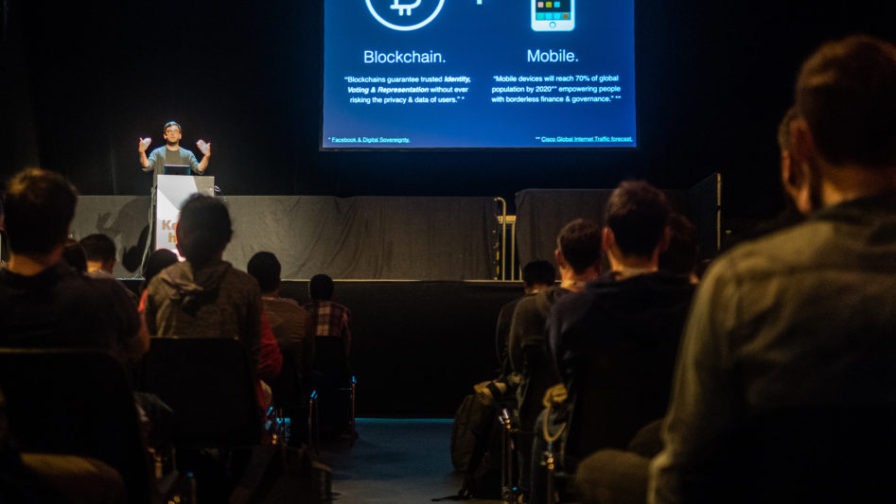
Santiago Siri is a founder of Democracy Earth Foundation, a Y Combinator-backed non-profit incorruptible digital governance for small and large communities – an open source and democratic solution to online voting.
An advocate for Bitcoin exchange, Siri is a partner of Bitex.la, the largest Bitcoin fintech company in Argentina. He is the author of ‘Hacktivismo’, a 2015 publication that evangelizes the virtues
Santiago Siri has keynoted Codemotion Berlin 2017 and we have asked him a couple of questions to introduce him to everyone who doesn’t know him yet. Also to give a sneak peek at his talk “Killing the Big Brother“, where he talked about the importance of building new models for democratic governance that enable humanity to collaborate and address global issues in transparency. He introduced Democracy Earth foundation and elaborated on how to fight the uneven distribution of opportunity around the globe by building free, open source software for incorruptible voting for organizations of all sizes establishing a true democratic governance for the Internet age.
Discover more about Codemotion Berlin!
Let’s learn more about Democracy Earth Foundation, Santiago’s predictions for the future of politics and improving it with software.
Your keynote speech was focused on your work at the Democracy Earth Foundation. Could you tell why was this project founded and what does your work there entail?
Democracy Earth Foundation was started when we did Y Combinator in 2015 as a way to create an organization able to think about governance without borders. We see the rise of blockchain based technology to develop censorship resistant institutions of all kinds and our focus is to understand the nature of voting under these decentralized networks.
How can a software tool help to fix politics?
P2P networks can lead to a new generation of purely digital institutions that can run on transnational networks and encrypt their information avoiding any kind of surveillance. This new political landscape (digital, encrypted, decentralized) renders many of the functions of traditional governance obsolete. In this sense, we see cryptocurrencies and emergent technologies for governance as competing with traditional Nation-States since they enable ways of cooperation unprecedented in human civilization. Unlike politicians who deliver soft promises, blockchains encode hard promises that once stored by their consensus mechanism, those decisions become incorruptible. Transparency by default vs regulation of decision laundering is a step forward.
A big challenge with online democracy is fraud prevention. Could you elaborate on this and how you use blockchain technology to build a reliable online voting system?
We put a strong emphasis on two kinds of attacks we see likely to happen on decentralized democracies: sybil attacks (identity forgery) and gossip (fake news). Identity is a big issue where we collaborate with many teams tackling it (ie: blockstack, consensus). Our take is to develop a “Proof of Identity” protocol complex enough to be hard for AIs to simulate, yet simple enough to enable human attention to validate participants in the network. Regarding gossip, by storing decisions on blockchains we expect that institutional information can be scrutinized by anyone without permission, in the case of democracies even turning every voter into an auditor of the process without needing special rights. That kind of trust is only possible in the context of blockchains.
How does a borderless peer to peer democracy challenge the power of nation states?
The core goal is to guarantee fair distribution of opportunity across the globe. Today if you’re born in Germany or if you’re born in Zimbabwe, the chances of accessing to opportunities for progress are quite different between each country. If we can start structuring financial and governance systems that can reach any place on Earth without the restrictions imposed by legacy governments, then the need to migrate or travel in seek for a better life can be mitigated by the internet’s ability to deliver tools and opportunities to anyone in the planet. In this sense we favour the internet becoming a planetary jurisdiction on its own right using blockchains to regulate economic and political behaviour online.
What role does open source play in the Foundation and what benefits do you hope to achieve with an open source model in the future?
Everything we do (software, paper, meetings) is open source and available for anyone to join and participate with us in our projects. It’s both an ethical and technical decision that helps breed trust in everything we do. Democracy cannot be done otherwise.
Are you interested in learning more about Santiago Siri? Listen to Killing the Big Brother Podcast!



